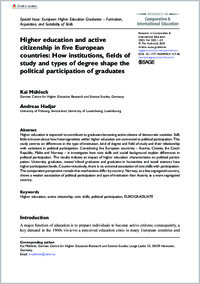Higher education and active citizenship in five European countries: How institutions, fields of study and types of degree shape the political participation of graduates
BP2-STS
- Mühleck, Kai DZHW
- Hadjar, Andreas ORCID University of Fribourg
- 15.02.2023
Published in:
- Research in Comparative & International Education. - 2023, vol. 18, no. 1, p. 32-54
English
Higher education is expected to contribute to graduates becoming active citizens of democratic societies. Still, little is known about how heterogeneities within higher education are connected to political participation. This study centres on differences in the type of institution, kind of degree and field of study and their relationship with variations in political participation. Considering five European countries – Austria, Croatia, the Czech Republic, Malta and Norway – it investigates how civic skills and social background explain differences in political participation. The results indicate an impact of higher education characteristics on political participation. University graduates, master’s-level graduates and graduates in humanities and social sciences have higher participation levels. Counter-intuitively, there is no universal association of civic skills with participation. The comparative perspective reveals that mechanisms differ by country. Norway, as a less segregated country, shows a weaker association of political participation and type of institution than Austria, as a more segregated country.
- Faculty
- Faculté des lettres et des sciences humaines
- Department
- Département de travail social, politiques sociales et développement global
- Language
-
- English
- Classification
- Social work
- License
-
License undefined
- Open access status
- green
- Identifiers
- Persistent URL
- https://folia.unifr.ch/unifr/documents/324000
Statistics
Document views: 105
File downloads:
- mhleck_hadjar_2023_researchincomparativeandinternationaleducation: 83
